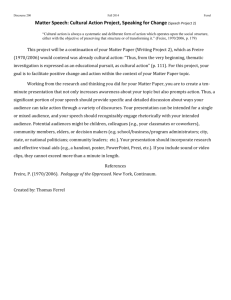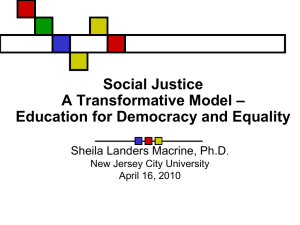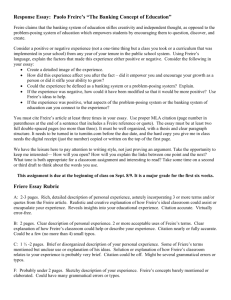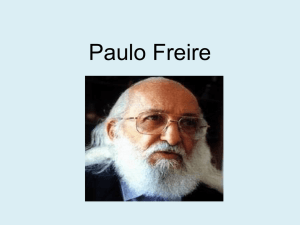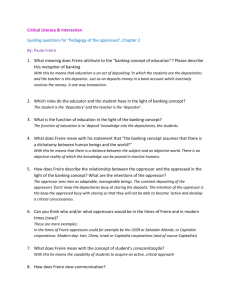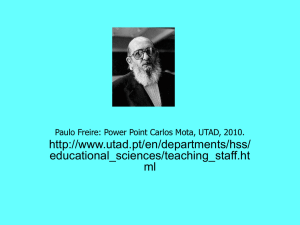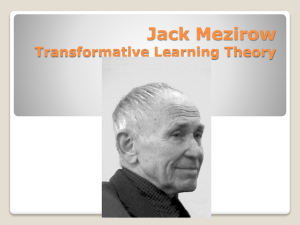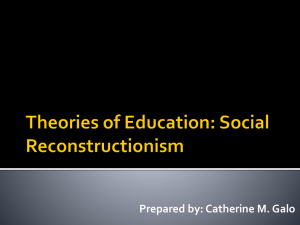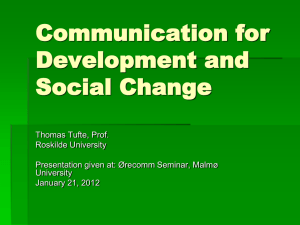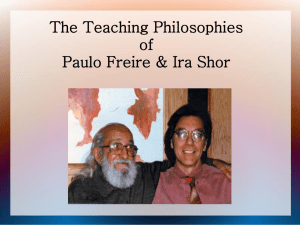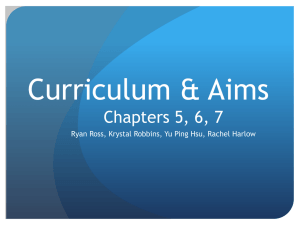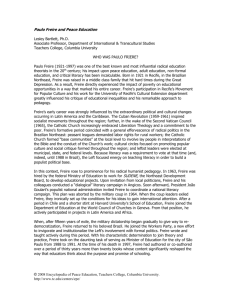Paulo Freire - SUNY Oneonta
advertisement
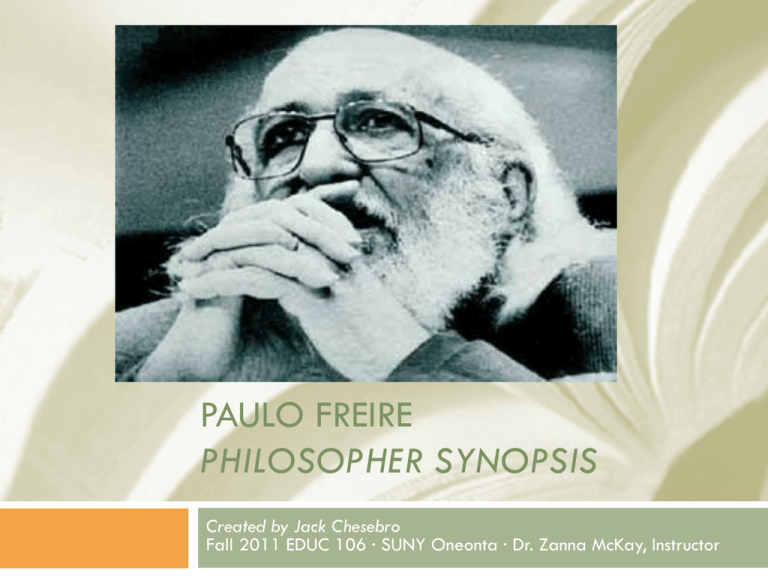
PAULO FREIRE PHILOSOPHER SYNOPSIS Created by Jack Chesebro Fall 2011 EDUC 106 · SUNY Oneonta · Dr. Zanna McKay, Instructor Biography (University of Iowa) Born on September 29, 1921 in Recife, Brazil. This town served as a major port on the coast of northeastern Brazil. Died on May 2, 1997 in Sao Paulo, Brazil as a result of heart failure. Freire was born into a poor family. His own struggles with poverty and hunger ultimately influenced his decision to enter the educational field. In Freire’s own words on his life: I didn’t understand anything because of my hunger. I wasn’t dumb. It wasn’t lack of interest. My social condition did not allow me to have an education. Experience showed me once again the relationship between social class and knowledge. (University of Iowa) Freire’s Education (University of Iowa) When his family’s financial situation improved, Freire earned a law degree at the University of Recife in Brazil. He then went on to teach Portuguese in the Brazilian secondary schools. In 1946, he became employed as the director of an adult education agency called SESI. In 1959, he completed his Ph.D. From 1961 until 1964, he served as the first Director in the cultural extension department at Recife to bring literary programs to the poor. Freire’s Disagreements with Educational Philosophy (Corbett) – “The Banking Concept of Education” Freire did not like the current philosophy of student learning, where students were instructed to “record, memorize, and repeat” not understanding the “true significance” of their learning. He called the educational philosophy of that time “mechanical.” To illustrate the philosophy, he analogously compared students to “receptacles” in which teachers “deposit” knowledge. Classroom effectiveness was dependent on how much knowledge a teacher could “deposit” and how “receptive” a student was. Teaching Strategies and Vocabulary Terms (University of Miami) Freire was an creator of a number of educational philosophies and terms: “Banking” Education – passive learners have preselected knowledge deposited in their minds. “Culture of Silence” – learners lose the means to independently respond to cultural happenings and are forced into responding and thinking according to one specific method. “Conscientization” – a process by which the learner increases self-awareness of what they are learning An Interpretation of Freire’s Teaching Style (Miller, 1998) Teaching is focused towards students’ needs and abilities. What is learned in the classroom has a “real-world” application. Having students learn according to the demands of a higher authority is unacceptable. A list of Freire’s works (University of Miami) http://www.education.miami.edu/ep/contemporary ed/Paulo_Freire/paulo_freire.html Freire’s Disciplinary Ideas and Goals for Students (Gibson, 1994) Freire had no real ideas on the subject of discipline. He did have one main goal, which was to have all students become literate to develop thinking skills that would promote change in society by the time they left school. Contributions that are used today (Nyirenda, 2005) “Conscientization and dialogue” method of reading – teaches adults how to read and write based on their current social standing; a method of reflection and response. “Liberating Education” – students participate in the learning process and are not told by a central authority about how they should think. “Extension” – the mechanical transfer of content from one source to another; Freire disagrees with this method of learning. Contributions that are used today (Nyirenda, 2005) “Cultural invasion” – the idea that an agent of extension takes his or her views and imposes them on another group of people; Freire disapproves of this as well. “Communication” – people should be in dialogue with one another to promote intellectual inquiry, not to submit to the demands of a state. These ideas are in use today, particularly in African countries. Criticisms (Gibson, 1994 ; Nyirenda, 2005) "Paulo Freire has only one desire: that his thinking: may coincide historically with all those who, whether they live in those cultures which are wholly silenced or in silent sectors of cultures which prescribe their voice, are struggling to have a voice of their own. - Robert Mackie “…the greatest living educator, master, and teacher” – P.V. Taylor Any questions? References Corbett, R. (n.d.). Paulo Freire: Chapter 2 of Pedagogy of the Oppressed. Retrieved October 25, 2011, from Webster University: http://www.webster.edu/~corbetre/philosophy/education/freire/freire-2.html Gibson, R. (1994). The Promethean Literacy: Paulo Freire's Pedagogy of Reading, Praxis, and Liberation. The Pennsylvania State University. University Park, PA: The Pennsylvania State University. Miller, R. E. (1998, September). The Arts of Complexity: Pragmatism and the Culture of Schooling. College English, 61(1), pp. 10-28. Nyirenda, J. E. (2005, January 20). The Relevance of Paulo Freire's Contributions to Education and Development in Present Day Africa. East Lansing, Michigan, United States: Michigan State University. University of Iowa School of Library and Information Science. (n.d.). Paulo Freire. Retrieved October 25, 2011, from University of Iowa School of Library and Information Science: http://mingo.info-science.uiowa.edu/~stevens/critped/freire.htm University of Miami School of Education. (n.d.). Paulo Freire. Retrieved October 25, 2011, from University of Miami School of Education: http://www.education.miami.edu/ep/contemporaryed/Paulo_Freire/paulo_freire.html
